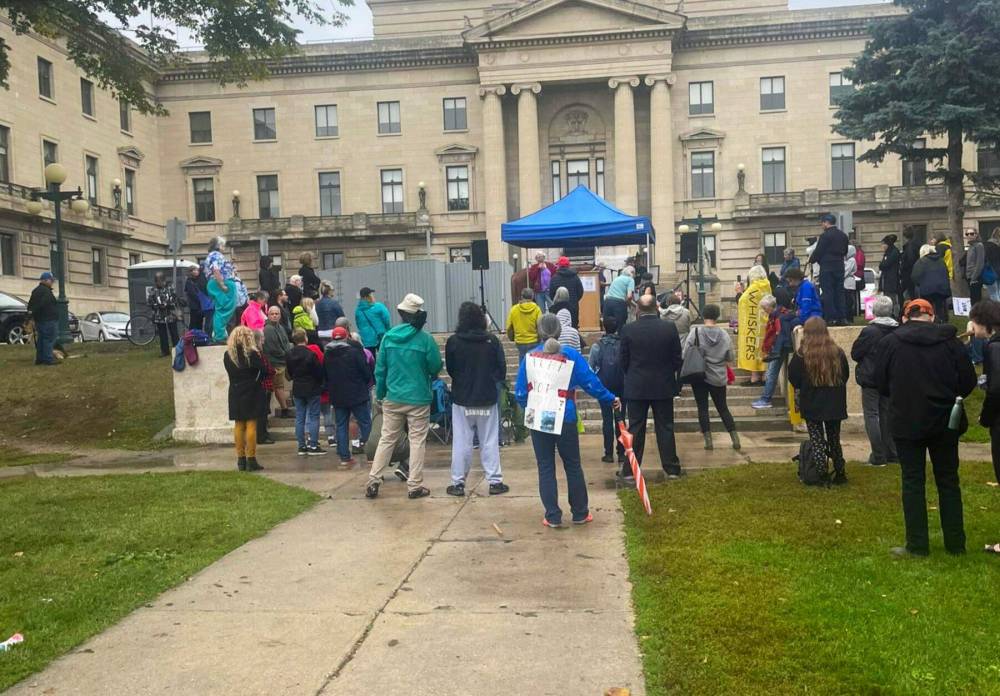Rally exposes suffering of animals
Advertisement
Hey there, time traveller!
This article was published 18/10/2023 (741 days ago), so information in it may no longer be current.
In my last column, readers were invited to a rally called Vote Animal on the grounds of the Manitoba Legislature on Saturday, Sept. 23. Its aim was to make animal protection an election issue
Debbie Wall, co-organizer of the rally held at the Legislative grounds, set the stage for an impressive slate of speakers by pointing to weak laws surrounding animal care in Manitoba and a lack of enforcement of the regulations that do exist. She was joined by speakers from various animal-care organizations, all of whom talked about their experiences of and encounters with animal abuse happening right here in our city and province.
Veronica Walsh, of Fixing Feral Felines, spoke about the problem of cat over-population and the need to spay and neuter cats, while Lori-Ann Peach, of Paws for a Cause, which is also involved with feral cat rescue in rural Manitoba, said municipalities need to support a spay and neuter program.

Supplied photo
Speakers from Manitoba’s animal advocacy community spoke passionately about animal protection at the Vote Animal rally on Sept. 23.
Colleen Walker of The Little Red Barn sanctuary has been rescuing farm animals designated for slaughter for years. The sanctuary takes in horses, cows, pigs, goats, chickens, and even cats and dogs — animals that are no longer deemed profitable, so not worthy of care.
Kimberly and Corinne of Blackbird Ranch Equine Rescue and Rehab brought Poppy — a beautiful brown mare they had rescued — to the rally. Poppy spent her entire life producing foals and when she could no longer serve that purpose was designated for slaughter.
Danae Tonge of Manitoba Animal Save, focused on Manitoba’s ‘ag-gag’ legislation (Bill 62), which makes it illegal to try to expose the suffering of farmed animals. She said animal agriculture veterinarians are not being diligent in carrying out their responsibility for animal care and protection, merely performing a perfunctory role.
Twyla Francois, an animal research investigator with Animal Alliance of Canada, talked about the suffering animals endure while being transported to slaughter, relaying the story of Emily, a ‘spent’ dairy cow, and her heroic attempts to save Emily from slaughter.
Kaitlyn Mitchell, director of legal advocacy at Animal Justice, provided an overview of Manitoba’s Animal Care Act. The existing act allows for abuse in all industrialized settings. Even if regulation were enforced, exemptions are made for hog barns, which is just one of the reasons the Animal Care Act needs to be changed.
Brittany Semeniuk, a registered veterinary technologist, member of the Winnipeg Humane Society (WHS) animal compassion team, and co-organizer of the rally, spoke about the proliferation of puppy mills, back yard breeders and the unregulated sale of puppies, as well as the availability of as many as 500 “exotic” breeds on kijiji in any one day.
Lori Cohen, of The Beagle Alliance, spoke about the popularity of beagles among breeders because they are the breed most-often used in laboratory research.
Dr. Jonas Watson, Grant Park Animal Hospital, spoke about the overpopulation of dogs on northern Manitoba First Nations, and how the cost of trips to spay and neuter these dogs are barely covered by the resources available for this program. More money is needed for spay and neuter programs, as well as funds for animal protection officers to enforce laws.
Vicki Burns, former CEO of WHS, director of Save Lake Winnipeg Project and board member of Hog Watch Manitoba, was the final speaker. She said that enforcement of existing regulations for industrialized hog barns is not being carried out. She pointed to a strong correlation between expansions of industrialized hog barns in Manitoba and increased algae blooms on Lake Winnipeg. In addition to covering the environmental damage created by these barns, Vicki made an earlier presentation at WHS, where she focused on the suffering pigs endure through overcrowding and confinement, resulting in the use of sub-therapeutic antibiotics to aid their survival, which adds to the threat of antibiotic resistance for humans.
The common denominator with each of the speakers was a lack of government will to make necessary changes to care for and protect animals that are raised for profit, which suffer through their short lives up to and including their transport to slaughter.
If you agree that change is needed, make your feelings known to the next minister of agriculture.

Donna Minkus
Charleswood community correspondent
Donna Minkus is a community correspondent for Charleswood.
Our newsroom depends on a growing audience of readers to power our journalism. If you are not a paid reader, please consider becoming a subscriber.
Our newsroom depends on its audience of readers to power our journalism. Thank you for your support.




